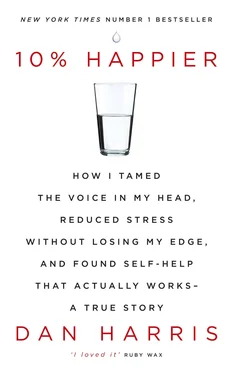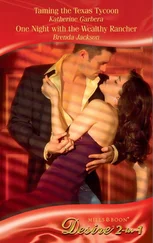For me, the most pathetic part of the entire story was talking to the survivors who still claimed to believe in Ray. We went to the home of Brian Essad, an unassuming employee at an event production company. He showed us his “visioning board,” on which he had a picture of Alyssa Milano, who he was hoping to meet. He also showed us the books and handouts he’d collected from all the Ray retreats he’d attended. Then he revealed all the unpaid bills that were mounting on his kitchen table—bills he might have been able to pay if he hadn’t given so much money to Ray. “It’s like right now, I don’t actually have enough cash in my account to pay all these bills. So I’m just kind of putting out there that I need to attract money that I need to pay all these.”
After investigating for four months, police in Arizona charged Ray with manslaughter. The man who once told viewers of The Secret that they should treat the universe as if it were Aladdin’s lamp was perp-walked in front of news cameras, wearing handcuffs and leg irons, looking mortified. Even though he’d authored a book called Harmonic Wealth , he said he didn’t have enough money to make bail. In another delicious twist, investigators released documents that seemed to explain how Ray maintained his robust physical appearance. It wasn’t the Law of Attraction. After the sweat lodge, police found a suitcase in Ray’s room, filled with diet supplements and prescribed steroids.
That discovery in the hotel room crystallized everything that I found most absurd and hypocritical about the self-help industry. To tell the truth, it hadn’t taken long for me to figure out that this scene was not for me. Luckily, with an assist from my future wife, I’d found something more promising.
I was back at the Tribeca Grand, the self-consciously hip hotel in downtown Manhattan where I’d stayed in the days after 9/11. The place had now been restored to its natural state, with mood lighting, techno music, and well-dressed people sipping foreign beers on fluffy chairs. Hardly the environment in which I would have expected to find the kind of guru I was looking for. Until this moment, in fact, I hadn’t quite realized that looking for a guru was what I’d been doing all along.
The guy standing here with me at the bar certainly would not have embraced the title, which was, of course, part of his appeal. He was totally reasonable and utterly uncheesy, a man with actual credentials, including a medical degree from Harvard, which conferred a sort of legitimacy that, say, an online degree from the University of Sedona did not.
His basic message was that the best self-help program was developed 2,500 years ago—a worldview that, oddly enough, held that there is actually no “self” to “help.”
The seeds of this encounter had been planted one evening at home as I was changing out of my suit and tie and into sweatpants, shucking sartorial detritus—pants, socks, belt—all over the floor. I enjoyed doing this not only because it appealed to both my laziness and my constant desire to rush to the next thing ( The sooner I get these clothes off, the sooner I’ll get dinner ), but also because it annoyed Bianca, who sometimes playfully called me Hurricane Harris. On this night, though, she was not taking the bait. She was coming at me with a gift, in fact.
In her hands she had a pair of books written by someone named Dr. Mark Epstein. She told me that, after months of listening to me alternately rhapsodize or carp about Eckhart Tolle et al., it had finally clicked with her why the ideas I was yammering on about with varying levels of cogency sounded so familiar. About ten years prior, she had read some books by Epstein who, she explained, was a psychiatrist and a practicing Buddhist. His writing had been useful for her during a difficult time in her twenties, a quarter-life crisis when she was struggling with family issues as well as the decision about whether to embark on the interminable training necessary to become a doctor.
I flipped over one of the paperbacks to get a look at this Epstein character, and there on the back cover was a kind-faced, middle-aged guy wearing a V-neck sweater and wire-rimmed glasses, sitting on the floor against the type of white backdrop you often see in photography studios. Even though he looked infinitely less weird than either Eckhart Tolle or Deepak Chopra, I still found myself thinking, Not my kind of guy.
That mild, momentary spasm of aversion was assuaged by the little bio next to Epstein’s picture, which said he was a trained psychiatrist with a private practice in Manhattan.
Thus began another night of delayed sleep and revelatory reading, with Bianca quietly dozing by my side. It was like my first evening with Tolle, only less embarrassing. What I found in the pages of Epstein’s book was thunderously satisfying. Like scratching an itch in an unreachable area. Like finally figuring out why Luke Skywalker and Princess Leia’s sexual tension never felt right. Very quickly, it became blazingly clear: The best parts of Tolle were largely unattributed Buddhism. Tolle had not, as I’d assumed when I’d first read A New Earth , made up his insights out of whole cloth. Apparently he’d appropriated them, and then effected a sort of intellectual elephantiasis, exaggerating their features in the most profitable of ways. Two and a half millennia before Eckhart Tolle started cashing his royalty checks, it was the Buddha who originally came up with that brilliant diagnosis of the way the mind works.
In Epstein’s writings, it was all there: the insatiable wanting, the inability to be present, the repetitive, relentlessly self-referential thinking. Here was everything that fascinated me about Tolle, without the pseudoscience and grandiloquence. To boot, the good doctor could actually write. Compared to Tolle, in fact, this guy was Tolstoy. After months of swimming against the riptide of bathos and bullshit peddled by the self-help subculture, it was phenomenally refreshing to see the ego depicted with wry wit.
“We are constantly murmuring, muttering, scheming, or wondering to ourselves under our breath,” wrote Epstein. “ ‘I like this. I don’t like that. She hurt me. How can I get that? More of this, no more of that.’ Much of our inner dialogue is this constant reaction to experience by a selfish, childish protagonist. None of us has moved very far from the seven-year-old who vigilantly watches to see who got more.” There were also delightful passages about the human tendency to lurch headlong from one pleasurable experience to the next without ever achieving satisfaction. Epstein totally nailed my habit of hunting around my plate for the next bite before I’d tasted what was in my mouth. As he described it, “I do not want to experience the fading of the flavor—the colorless, cottony pulp that succeeds that spectacular burst over my taste buds.”
Prior to reading Epstein, my most substantial interaction with Buddhism was when, as a fifteen-year-old punk kid, I stole a Buddha statue from a local gardening store and put it my bedroom because I thought it looked cool. Despite the fact that I was now a religion reporter, I still had only a glancing understanding of this faith. With Buddhists comprising only about 1/300 of the U.S. population and not being in the habit of taking strident political stands, they didn’t attract much coverage. What I knew of Buddhism was limited to the following: it was from Asia somewhere; the Buddha was overweight; and his followers believed in things like karma, rebirth, and enlightenment.
Epstein made clear, though, that you didn’t have to buy into any of the above to derive benefit from Buddhism. The Buddha himself didn’t claim to be a god or a prophet. He specifically told people not to adopt any of his teachings until they’d test-driven the material themselves. He wasn’t even trying to start a religion, per se. The word Buddhism was actually an invention of the nineteenth-century Western scholars who discovered and translated the original texts. As best I could tell, the whole thing appeared to be less a faith than a philosophy, and one that had been intriguing psychologists since the days of Freud, when his early Viennese followers studied those newly translated texts. In recent decades, the mental health community had come to embrace Buddhism in an increasingly thoroughgoing way. According to Epstein, the Buddha may well have been the “original psychoanalyst.” To my surprise, Epstein seemed to be arguing that Buddhism was better than seeing a shrink. Therapy, he said, often leads to “understanding without relief.” Even Freud himself had conceded that the best therapy could do was bring us from “hysteric misery” to “common unhappiness.”
Читать дальше












